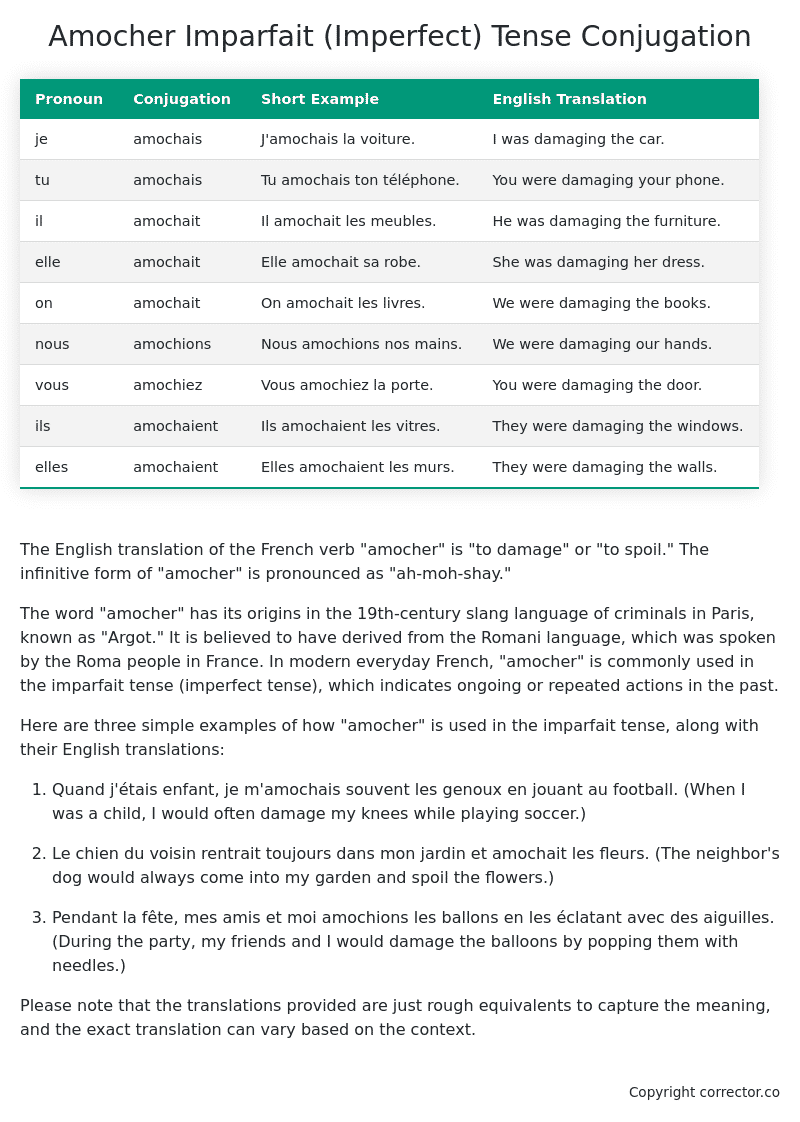Imparfait (Imperfect) Tense Conjugation of the French Verb amocher
Introduction to the verb amocher
The English translation of the French verb “amocher” is “to damage” or “to spoil.” The infinitive form of “amocher” is pronounced as “ah-moh-shay.”
The word “amocher” has its origins in the 19th-century slang language of criminals in Paris, known as “Argot.” It is believed to have derived from the Romani language, which was spoken by the Roma people in France. In modern everyday French, “amocher” is commonly used in the imparfait tense (imperfect tense), which indicates ongoing or repeated actions in the past.
Here are three simple examples of how “amocher” is used in the imparfait tense, along with their English translations:
-
Quand j’étais enfant, je m’amochais souvent les genoux en jouant au football.
(When I was a child, I would often damage my knees while playing soccer.) -
Le chien du voisin rentrait toujours dans mon jardin et amochait les fleurs.
(The neighbor’s dog would always come into my garden and spoil the flowers.) -
Pendant la fête, mes amis et moi amochions les ballons en les éclatant avec des aiguilles.
(During the party, my friends and I would damage the balloons by popping them with needles.)
Please note that the translations provided are just rough equivalents to capture the meaning, and the exact translation can vary based on the context.
Table of the Imparfait (Imperfect) Tense Conjugation of amocher
| Pronoun | Conjugation | Short Example | English Translation |
|---|---|---|---|
| je | amochais | J’amochais la voiture. | I was damaging the car. |
| tu | amochais | Tu amochais ton téléphone. | You were damaging your phone. |
| il | amochait | Il amochait les meubles. | He was damaging the furniture. |
| elle | amochait | Elle amochait sa robe. | She was damaging her dress. |
| on | amochait | On amochait les livres. | We were damaging the books. |
| nous | amochions | Nous amochions nos mains. | We were damaging our hands. |
| vous | amochiez | Vous amochiez la porte. | You were damaging the door. |
| ils | amochaient | Ils amochaient les vitres. | They were damaging the windows. |
| elles | amochaient | Elles amochaient les murs. | They were damaging the walls. |
Other Conjugations for Amocher.
Le Present (Present Tense) Conjugation of the French Verb amocher
Imparfait (Imperfect) Tense Conjugation of the French Verb amocher (You’re reading it right now!)
Passé Simple (Simple Past) Tense Conjugation of the French Verb amocher
Passé Composé (Present Perfect) Tense Conjugation of the French Verb amocher
Futur Simple (Simple Future) Tense Conjugation of the French Verb amocher
Futur Proche (Near Future) Tense Conjugation of the French Verb amocher
Plus-que-parfait (Pluperfect) Tense Conjugation of the French Verb amocher
Passé Antérieur (Past Anterior) Tense Conjugation of the French Verb amocher
Futur Antérieur (Future Anterior) Tense Conjugation of the French Verb amocher
Subjonctif Présent (Subjunctive Present) Tense Conjugation of the French Verb amocher
Subjonctif Passé (Subjunctive Past) Tense Conjugation of the French Verb amocher
Subjonctif Imparfait (Subjunctive Imperfect) Tense Conjugation of the French Verb amocher
Subjonctif Plus-que-parfait (Subjunctive Pluperfect) Tense Conjugation of the French Verb amocher
Conditionnel Présent (Conditional Present) Tense Conjugation of the French Verb amocher
Conditionnel Passé (Conditional Past) Tense Conjugation of the French Verb amocher
Conditionnel Passé II (Conditional Past II) Tense Conjugation of the French Verb amocher
L’impératif Présent (Imperative Present) Tense Conjugation of the French Verb amocher
L’impératif Passé (Imperative Past) Tense Conjugation of the French Verb amocher
L’infinitif Présent (Infinitive Present) Tense Conjugation of the French Verb amocher
L’infinitif Passé (Infinitive Past) Tense Conjugation of the French Verb amocher
Le Participe Présent (Present Participle) Tense Conjugation of the French Verb amocher
Le Participe Passé (Past Participle) Tense Conjugation of the French Verb amocher
Struggling with French verbs or the language in general? Why not use our free French Grammar Checker – no registration required!
Get a FREE Download Study Sheet of this Conjugation 🔥
Simply right click the image below, click “save image” and get your free reference for the amocher imparfait tense conjugation!

Amocher – About the French Imparfait Tense
NOTE: To take a deep dive into all the French tenses then see our article on Mastering French Tense Conjugation.
Formation of the Imparfait Tense
For regular -er verbs:
For regular -ir verbs
For regular -re verbs
Common Everyday Usage Patterns
Description of Past Habits
Background Information
Mental and Emotional States
It’s employed to express emotions, thoughts, or physical sensations in the past. For example: “J’étais content quand il est arrivé.” (I was happy when he arrived.)
Ongoing Actions
Points to Note About the Imparfait Tense
Passé Composé vs. Imparfait
Conditional
Si Clauses
Narration
I hope you enjoyed this article on the verb amocher. Still in a learning mood? Check out another TOTALLY random French verb imparfait conjugation!


